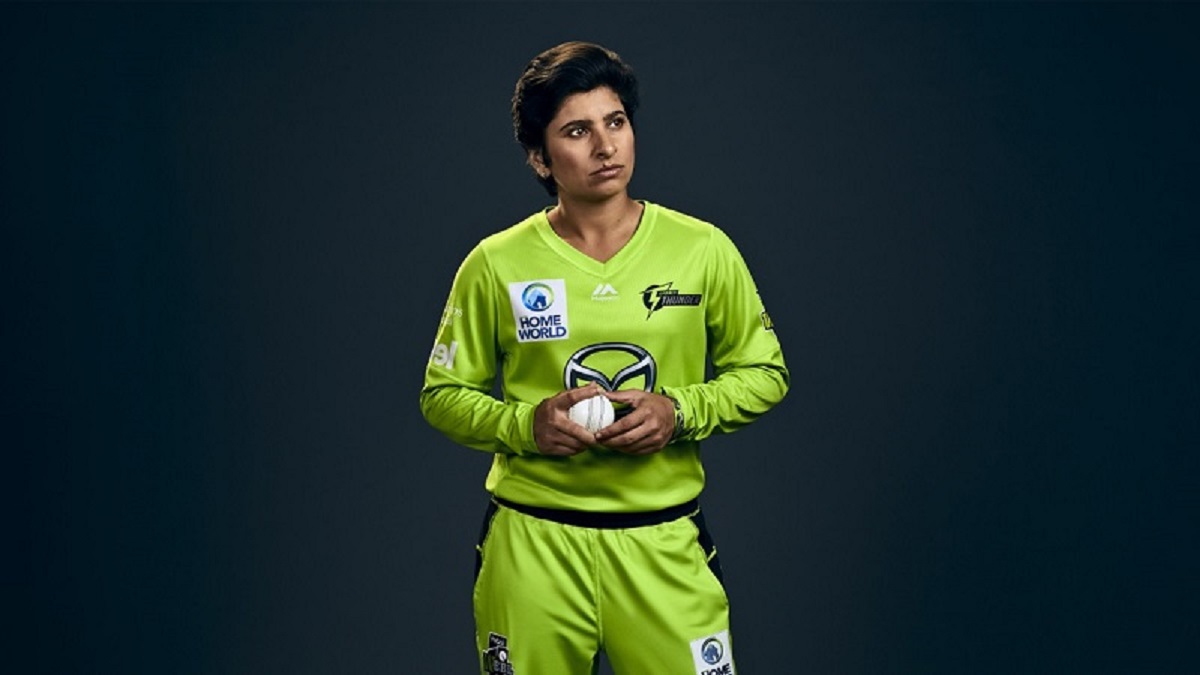It’s a well-recognized fact that the Pakistan women’s national cricket team is bolstered by the talent Nida Dar brings to the field. Yet despite Dar’s place in international cricket, our men can’t seem to get past judging her for her appearance.
In a video clip from G Sarkar with Nauman Ijaz broadcast June 6 on Neo News, cricket player Abdul Razzaq commented on Dar’s appearance, strongly implying that the cricketer looks more like a man than a woman. The clip recently caught the attention — and ire — of social media.
“She aspires to come to the level of the men’s cricket team and believes that men aren’t the only ones who can do everything, women can do these things as well,” he said. “That’s why the feeling is gone. Shake her hands and you won’t even feel she’s a girl.”
Razzaq’s comments are shocking, but unfortunately, they aren’t something women athletes haven’t heard before. There are deep-set negatives attitudes towards the bodies of female athletes all around the world but especially in Pakistan where women are policed to look a certain way in general.
Women are often commented on as being “too bulky”, “too tough” and more popularly “too much like a man”. Such attitudes overlook years of training and a long list of achievements and boil the achievements of athletes down to a single trait — the way they look. The mental toll of such remarks on women is often much greater than is realized. And there’s one thing we would like to know — is there a set standard on what a woman should look like? Women look like what they look like — we come in all shapes and forms and not everyone may fit your standard of femininity and that’s okay.
Women have short hair and women have long hair, women can be petite and women can be tall and broad-shouldered — women can look however they please.
Dar bore Razzaq’s comment with a lot of grace and dignity — far more than what we would have had in the same situation. She explained why women cricketers seem more ‘hardened’ than other women. “Our profession is such that we have to do batting, bowling and every other thing [that the sport requires] which needs fitness, so yes your body does become hard.”
In the interview, one of the host comedians also joked about how the cricketer seemed to be “allergic” to the notion of marriage since she didn’t mention it.
“If I hadn’t been a cricketer, I would have definitely been a [sports] professional of some sort,” Dar had said earlier in the show.
Most unmarried women in Pakistan of a ‘certain age’ are the victims of snide remarks about marriage and we’re pretty sure Dar is no different. But it being common doesn’t excuse behavior that devalues women based on their marital status. Such behavior is especially problematic if it occurs on a talk show watched by many people across the country.
This isn’t the first time male cricketers have made sexist remarks. In 2017, cricket and former coach Waqar Younis was called out for ‘suggesting’ on Twitter that the Women’s World Cup matches should have only 30 overs as the standard 50 were “a few too many”.
In 2019, cricketer Shahid Afridi met with criticism after he admitted in his autobiography Game Changer that he refuses to let his daughters play outdoor sports. “It’s for social and religious reasons that I’ve made this decision regarding my daughters not competing in public sporting activities and their mother agrees with me,” he wrote.
Razzaq himself isn’t a stranger to making controversial public remarks. On a television program in 2019, he admitted to being involved in extramarital relationships with many women.
The video clip of Razzaq and Dar has been circulating on social media recently and has left many people enraged. Users on Twitter are calling Razzaq out for his sexist remarks.
One user wrote, “Nida Dar is one of Pakistan’s finest cricketers.
“Abdul Razzaq and others gang[ed] up to try to reduce her to marriage, hairstyles and femininity. Shows that women can be national heroes but will still be measured up against traditional societal expectations and gender roles.”
Nida Dar is one of Pakistan's finest cricketers. Abdul Razzaq and these others gang up to try to reduce her to marriage, hairstyles and femininity. Shows that women can be national heroes but will still be measured up against traditional societal expectations and gender roles. https://t.co/iX9eKiNQdI
— Shiza Malik (@Shiza__Malik) July 15, 2021
Another user called the matter “disgusting”.
Shameful ridicule of a young cricket player by Abdul Razzaq. When you have played for the national team & have some level of respect, you should use that to encourage young cricketers, especially women, instead of shaming them based on gender stereotypes.pic.twitter.com/CtemldIcNb
— Usama Khilji (@UsamaKhilji) July 14, 2021
“Nida Dar should have slammed these people right there,” one user on Twitter wrote.
Nida Dar should have slammed these people right there. The saddest part is lady in pink was just as complicit as others. Who gives Razzak the right to make fun of a junior just because she's a woman? Imagine what would have been the reaction if it was the other way around. https://t.co/muLKpD6kZy
— Ariba Jalbani (@AribaJB) July 15, 2021
Dar has received international appreciation and recognition for her achievements in cricket. She is the first Pakistani cricketer to cross 100 wickets in the T20I format. According to the ICC, she is only the sixth cricketer overall to achieve this.
This achievement ranks Dar ahead of celebrated cricket players like Afridi, Umar Gul, and Saeed Ajmal in terms of wicket-taking in T20I matches.
In 2019, Dar also became the first Pakistani woman cricketer to feature in a foreign league after she was selected by Sydney Thunder as their overseas professional player in Australia’s Women’s Big Bash League.
This whole matter has left us fuming. Cricket players such as Razzaq should be the last ones to criticize women cricketers since they themselves can appreciate and understand what the game demands from its players, regardless of their gender. Even if you aren’t a cricket player, you should be able to understand what the sport demands from its athletes. We don’t judge Afridi or Umar Akmal or Virat Kohli based on their appearances, so why are we doing the same to Nida Dar?
Unfortunately, there were several people who justified Razzaq’s comments instead of criticizing them. One user on Twitter said, “He would also call Ahmed Shehzad a girlish boy so sit down, it was all in a light mood.”
Talk about a deeply problematic opinion. If it isn’t acceptable to criticize Dar as “too manly” then it isn’t acceptable to bully Shehzad as a “girlish boy” either. Sexism works both ways.
Razzaq is also an adult who should realize that he can’t just shoot his mouth off at his own discretion. He represented our country as part of our national team and now he’s representing sexist men with his comments. Your physical appearance does not determine the kind of cricket you play, your skills do that and it is safe to say that Nida Dar is a trailblazer and talented cricketer. We only wish people like Razzaq could see beyond their biases and prejudices and value women cricketers for being the stars they are.










